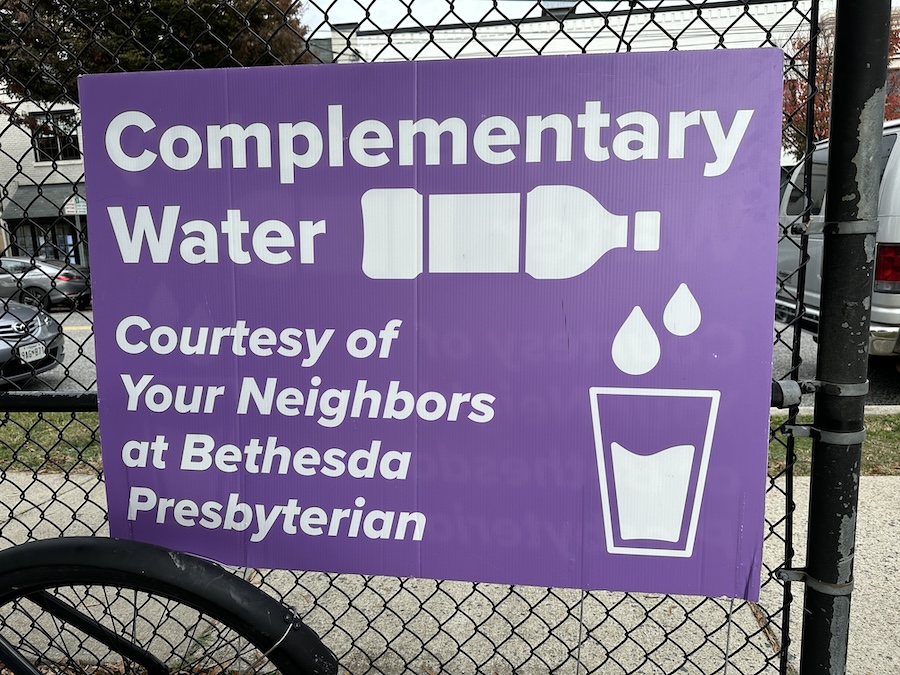Complementary water
« previous post | next post »
François Lang saw this sign at the local farmers market:
François asked the men at the booth what their water complements, but they did'nt get it.
Meanwhile, François introduced me to the Dihydrogen Monoxide Research Division (DHMO), whose roots go back to the early 80s.
Selected readings
- "Complimentary Internet in the lobby" (10/26/09)
- "Dihydrogen Monoxide" (3/15/04)

vat said,
October 29, 2023 @ 3:45 pm
I think this is the correct spelling of complement.
From Merriam Webster: "Both words come from the Latin complēre (meaning "to complete"). Complement refers to something that completes something else, while compliment has branched off to mean a remark "especially in the form of admiration, esteem, or approval," such as when paying someone a compliment for an achievement or for how they look."
https://www.merriam-webster.com/grammar/complement-and-compliment-usage-difference
Ask, instead, how "complimentary" coffee "compliments" you. Does it like your hat?
mg said,
October 29, 2023 @ 5:03 pm
@vat – This sign is using the word in the sense defined as
Complimentary: Given free as a courtesy or a favor.
https://www.merriam-webster.com/dictionary/complimentary
Compare to the various definitions for "complementary", none of which fit this situation.
https://www.merriam-webster.com/dictionary/complementary
Philip Taylor said,
October 29, 2023 @ 5:03 pm
The OED would not agree, vat — for "complimentary" it says (amongst other things, of course) :
whilst there is no analogous definition for "complementary".
Moon Moth said,
October 29, 2023 @ 5:09 pm
I'm not sure how accurate this is, but according to Wiktionary, English got "complement" straight from Latin, but it got "compliment" from French, which got it from Italian, which got it from Spanish, which derived from Latin. Apparently, according to this, Latin "complementum" more or less kept its meaning in French and Italian, but in Spanish it changed to have a new meaning. So the other languages borrowed the word with a new meaning from Spanish, and Spanish apparently went on to borrow a version of the word with the original meaning directly from its ancestor, Latin?
https://en.wiktionary.org/wiki/complement#English
https://en.wiktionary.org/wiki/compliment#English
Does anyone have better information or a better interpretation? I find these Wiktionary excursions fascinating, but I never know how much stock to put in them.
Tom Ace said,
October 29, 2023 @ 11:15 pm
OK, this is only peripherally related, but–
Montani semper liberi (motto of West Virginia) is Latin for 'mountaineers are always free'. Back in 2018, if you asked Google to translate it from Latin to German, the result was 'Bergsteiger sind immer kostenlos'–i.e., mountaineers are always free in the sense of being complimentary.
Cervantes said,
October 30, 2023 @ 8:49 am
This is a very common mistake, actually. It's like principal and principle, and many other homophones that people mix up. Of course, water can complement a meal.
Terry K. said,
October 30, 2023 @ 9:31 am
In this particular instance of these words, it's also like the "you're" in "you're welcome", in that, for many of us, our usual ways of understanding which spelling to use don't work. (you're = you are; your is possessive. Neither fits.)
Complimentary relates to compliment. Complementary relates to complete. Easy enough. Except neither, at the surface, fits with the usage in the sign. I'm not saying there's no logic to it. It's just not a logic that's clear to most of us.
Philip Taylor said,
October 30, 2023 @ 10:23 am
Very confused, Terry — "you're welcome", in that, for many of us, our usual ways of understanding which spelling to use don't work. (you're = you are; your is possessive. Neither fits.) — Surely "You are" fits perfectly, does it not ? "You’re welcome" ≡ "You are welcome".
Terry K. said,
October 30, 2023 @ 11:26 am
No, it doesn't. There's no logic to telling someone they are welcome after they thank you. The situation doesn't even have anything to do with anyone's arrival at a place. "You are welcome" would be something you say when someone's arrived at your door and you are letting them in (if being rather formal), not after you've done something and they've thanked you. "You're welcome" is simply a set phrase with no compositional meaning, in contemporary American English anyway.
Philip Taylor said,
October 30, 2023 @ 11:36 am
Well, as you probably know Terry, I don’t speak contemporary American English, but in British English the sequence "Thank you" / "You’re welcome" is elliptical for "Thank you" / "You are welcome [to whatever service or favour I was able to afford you]".
Shad Daly said,
October 30, 2023 @ 2:23 pm
As an American, I've always known "You're welcome" is short for "You are welcome" (and therefore the spelling made sense), but except for that I just knew it as a set phrase until several years ago when I looked it up and discovered what Phillip is saying.
Daniel Barkalow said,
October 30, 2023 @ 4:47 pm
The water on the sign obviously complements the cup on the sign. This is water to fill containers with, not water to drink from the source.
Peter Taylor said,
October 31, 2023 @ 9:36 am
Despite the inference which one might reasonably draw from apparent cognates in Romance languages, the etymology of the -come element directly relates to the meaning guest rather than to travel. And for what it's worth, OED attests very non-literal usage at least six centuries ago.
Frank Wilhoit said,
November 5, 2023 @ 12:28 pm
I grew up a couple of blocks from that farm market and am astounded that it is still going — I seem to remember them boasting that they were founded in 1938? Anyway it sits on what is now *extremely* high-value real estate and I would have thought that someone would have found a way to pull it out from under them long before now.